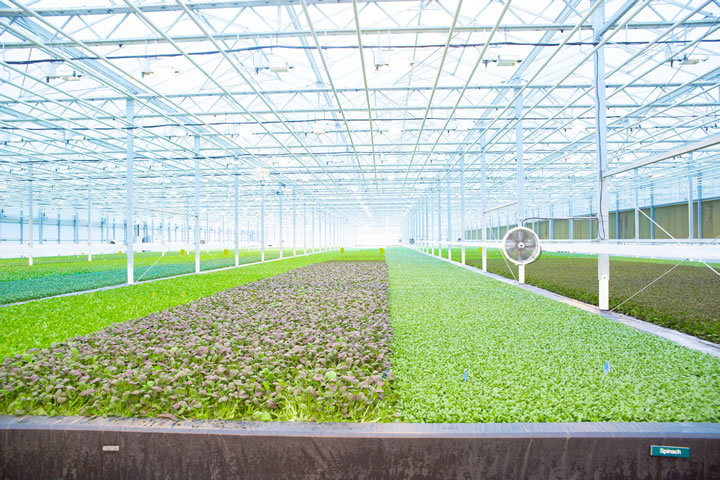BrightFarms Secures $100 Million Series E Round of Funding to Expand High-Tech Indoor Farming Across the U.S.

BrightFarms, a leading next-generation indoor farming company supplying U.S. grocery retailers with packaged salad greens, has secured more than $100 million in debt and new equity capital to support robust expansion plans. The Series E round of funding was led by Cox Enterprises, which now owns a majority stake in the company, and includes a follow-on investment from growth equity firm Catalyst Investors. BrightFarms will use the funds to invest in its current farms and retail programs and expand its network of regional indoor farms across the U.S.
BrightFarms has raised more than $200 million in funding to date to build the nation's first brand of locally grown produce and has established close partnerships with leading retailers such as Ahold Delhaize, Kroger and Walmart. BrightFarms currently distributes its products to more than 2,000 stores in the U.S. and expects to expand its distribution to more than 15,000 stores by 2025. The company has indoor farming operations in Illinois, Ohio, Pennsylvania and Virginia, with three new farms currently under development in North Carolina, Massachusetts and Texas.
BrightFarms is a leader in the rapidly growing indoor farming industry, a movement that seeks to disrupt the conventional produce industry by replacing the complex long-distance West Coast supply chain. Its growing methods use 80% less water, 90% less land and 95% less shipping fuel than traditional agriculture. A BrightFarms indoor farm yields 10 times more leafy greens per acre when compared to growing in a field. By growing its produce closer to consumers, BrightFarms delivers fresher, pesticide-free packaged greens to supermarkets in as little as 24 hours after harvest, about a week faster than leafy greens grown conventionally on the West Coast.
"Our goal over the next five years is to make quality, locally-grown greens a staple on grocery shelves and in refrigerators nationwide," said Steve Platt, CEO of BrightFarms. "We are thrilled to have the strong financial backing of Cox Enterprises, an organization that closely aligns with our mission to build a healthier and more sustainable future, and to have the additional support of our long-term partners at Catalyst Investors. Together we are ready to scale our model for local indoor farming in every major market in the U.S."
BrightFarms' vision for next-generation agriculture – a sustainable, scalable and disruptive model – closely aligns with the Cox Cleantech objectives and ethos.
"Cox Cleantech's goal is to build meaningful businesses that solve fundamental problems facing society and our environment," said Steve Bradley, vice president of cleantech for Cox Enterprises. "BrightFarms provides this opportunity through its sustainable model of growing food in the same communities where it's consumed, resulting in food that's fresher, safer, better tasting and better for the environment."
To learn more about BrightFarms, visit www.brightfarms.com.
About BrightFarms
BrightFarms is a leading provider of locally grown packaged salads, serving the freshest, tastiest and most responsibly grown produce to consumers nationwide. BrightFarms operates hydroponic greenhouse farms in the communities it serves, enabling it to eliminate time, distance, and costs from the food supply chain. BrightFarms' growing methods, a model for the future of scalable, sustainable local farming, use far less energy, land and water than long distance, field-grown agriculture. Forbes has recognized BrightFarms as one of the "100 Most Consumer Centric Companies" and Fast Company has recognized BrightFarms as "One of World's 50 Most Innovative Companies" and one of the "Top 10 Most Innovative Companies in Food." BrightFarms is funded by leading investors Cox Enterprises, Catalyst Investors, WP Global Partners and NGEN Partners. For more information, please visit www.brightfarms.com.
About Cox Cleantech
Established in 2017, Cox Cleantech is a part of Cox Enterprises, a $21 billion company with a 122-year history in communications, automotive and media business. The team is helping advance innovative solutions and technologies designed to sustainably meet the needs of a rapidly growing global population. Cox Cleantech invests in and acquires businesses that use natural resources efficiently, reduce humanity's impact on the planet and create resilient systems for an ever-changing world. Learn more at coxenterprises.com/cleantech.
About Catalyst Investors
Catalyst Investors is a growth equity firm founded in 2000. Catalyst's mission is to earn superior returns by helping entrepreneurs build great companies. Catalyst employs a rigorous top-down research focus that seeks to identify investment opportunities in companies and industries that will exhibit strong revenue growth. The firm works in true partnership with talented management teams to build long-term value. Past and present Catalyst portfolio companies include SaaS-based businesses (Weave, Fusion Risk Management, Jobvite, MessageLabs, MINDBODY), Business Services (Datavail, Effectual, Envoy, Reputation Institute), Food Tech (BrightFarms, ChowNow), Healthcare IT (Clinicient, PresenceLearning), and Internet Infrastructure (InSite Wireless Group, Latisys, Xplornet). For more information, visit www.catalyst.com.
Comments (0)
This post does not have any comments. Be the first to leave a comment below.
Featured Product

